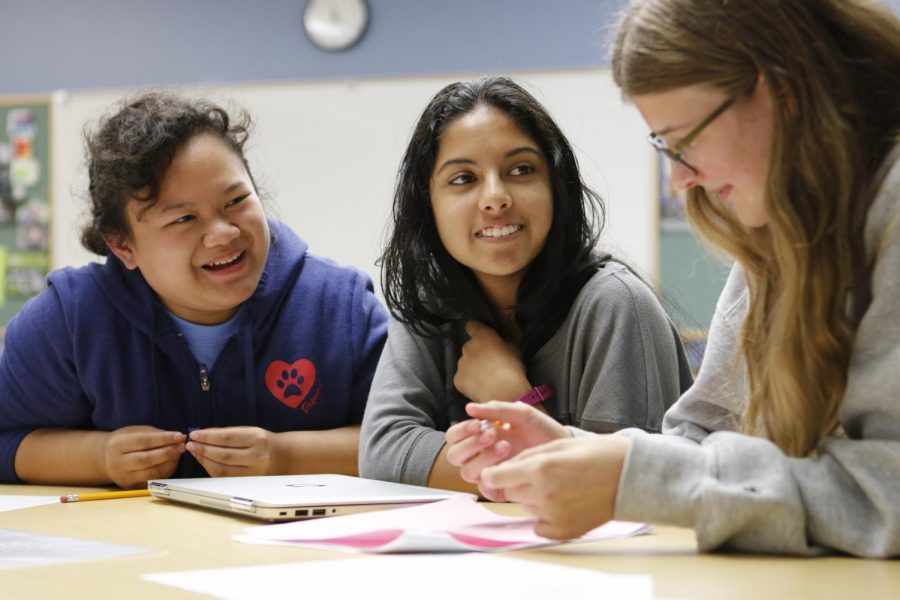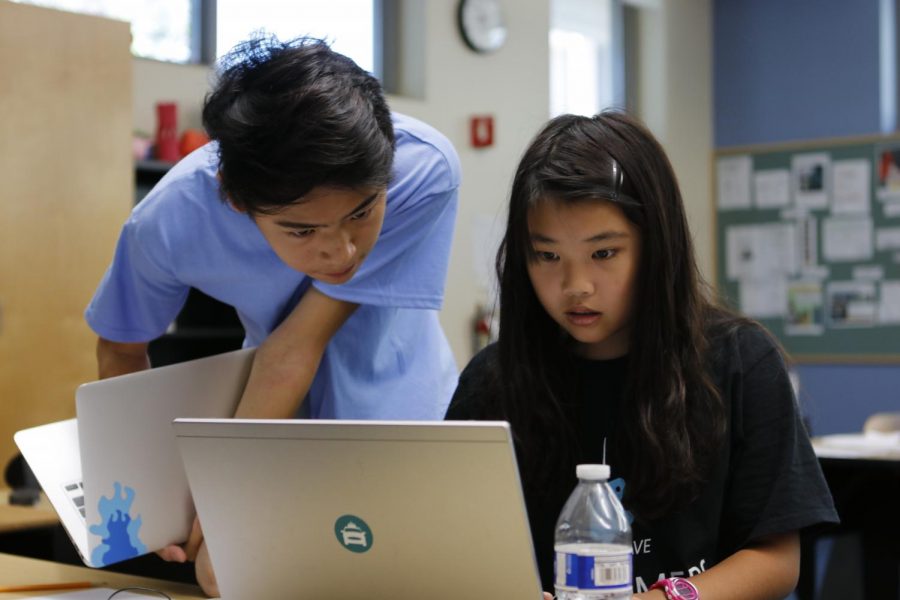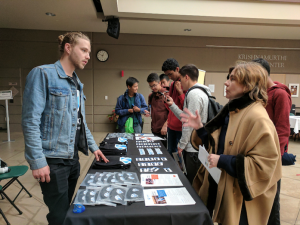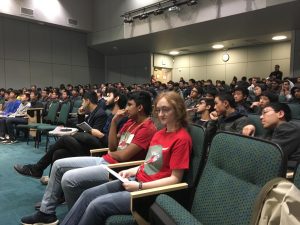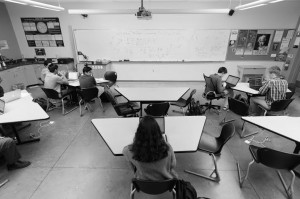Girls Programming League teams with Harker Programming Club to host inaugural Challenge
A team of students discusses one of the algorithmic programs from the contest. The Girls Programming League Challenge was hosted by the eponymous organization on Sept. 8.
September 19, 2018
Ukiah High School senior Miranda Ung woke up at five in the morning on Sept. 8, joining five of her schoolmates and their chaperones on a two-and-a-half hour bus ride to the Harker School. With few opportunities to participate in STEM-related competitions in their area, the girls often travel far distances to compete in such events.
Later that morning, 47 teams of middle and high school girls dispersed into the first-floor classrooms of Nichols Hall. With open notebooks and laptops on every table, the 105 girls worked through the morning to solve a set of nine algorithmic programming problems as members of the host organizations drifted between rooms and tables to assist them.
The inaugural Girls Programming League Challenge, co-hosted by the Girls Programming League (GPL) and the Harker Programming Club (HPC), invited female students to solve programming problems in groups of up to three members in either the Novice or Advanced division in two hours, ending with an awards ceremony that recognized high-scoring teams. The algorithmic contest problems required students to write programs that computed solutions based on problem inputs.
“GPL is one of the first computing competitions I’ve ever done,” Allison Jia (11), who participated with her sister Angela Jia (9), said. “I think it was really eye-opening, since I was kind of scared to do a programming competition before, but I think GPL really offered me an opportunity to try something new, and I did enjoy it.”
After the contest, Stanford Computer Science (CS) Professor Emma Brunskill and DataVisor CEO Yinglian Xie delivered Keynote presentations in the Nichols auditorium.
Brunskill, a member of the Stanford AI for Human Impact Lab, presented on reinforcement learning for education or designing educational programs while Xie delved into the topic of artificial intelligence (AI) for cybersecurity.
The speakers were followed by a panel discussion moderated by GPL founder and president Katherine Tian (12).
Panelists Hui Wang, Garima Thockchom, Avanti Shrikumar, Sonu Ratra and Haiying Huang offered insight into their experiences as leading women in the STEM and AI field.
“Because the STEM industry is so dominated by males, especially, GPL offers a opportunity for girls who maybe feel intimidated by the other guys who are doing CS,” Allison said. “This allows us to grow as a community of females who all have the same passions in CS. I think that’s really important for girls of our generation.”
Katherine was motivated to organize the event after noticing a recurring gender imbalance in the participation of STEM events.
“In March earlier this year, when Harker Programming Club was hosting the Harker Programming Invitational, there were 200 participants and only 30 of them were girls, and out the 18 winners only one of them was a girl,” she said. “I wanted to create an event to create this encouraging and welcoming environment for girls to be more involved in CS.”
For six months, GPL worked to find sponsorships, write and test the problems, reach out to speakers and set up for the event. Their efforts brought together over 100 female students for a contest with 100 percent female participation.
“It’s very satisfying to know that so many schools send so many students from so many schools do come and participate in the event,” Susan King, upper school computer science teacher and advisor of both GPL and HPC, said. “It is very satisfying to me to get the idea of programming—the joy of programming—out to so many students. Having programmed since 1969, I recognize the value of being aware that women are now underrepresented. There used to be, percentage-wise, more [female] programmers when I started. So I understand the desire to expose females to this; and it can be fun.”
At the end of the day, Katherine hoped that the girls who attended the event can realize that they are not alone in the field of computer science.
“Usually, if you don’t see representation, you might be a little discouraged,” she said. “I hope they got to see some potential role models today and be inspired by the great information that the speakers brought to the discussions today. Hopefully, they were encouraged to continue pursuing CS.”


















![“[Building nerf blasters] became this outlet of creativity for me that hasn't been matched by anything else. The process [of] making a build complete to your desire is such a painstakingly difficult process, but I've had to learn from [the skills needed from] soldering to proper painting. There's so many different options for everything, if you think about it, it exists. The best part is [that] if it doesn't exist, you can build it yourself," Ishaan Parate said.](https://harkeraquila.com/wp-content/uploads/2022/08/DSC_8149-900x604.jpg)




![“When I came into high school, I was ready to be a follower. But DECA was a game changer for me. It helped me overcome my fear of public speaking, and it's played such a major role in who I've become today. To be able to successfully lead a chapter of 150 students, an officer team and be one of the upperclassmen I once really admired is something I'm [really] proud of,” Anvitha Tummala ('21) said.](https://harkeraquila.com/wp-content/uploads/2021/07/Screen-Shot-2021-07-25-at-9.50.05-AM-900x594.png)







![“I think getting up in the morning and having a sense of purpose [is exciting]. I think without a certain amount of drive, life is kind of obsolete and mundane, and I think having that every single day is what makes each day unique and kind of makes life exciting,” Neymika Jain (12) said.](https://harkeraquila.com/wp-content/uploads/2017/06/Screen-Shot-2017-06-03-at-4.54.16-PM.png)








![“My slogan is ‘slow feet, don’t eat, and I’m hungry.’ You need to run fast to get where you are–you aren't going to get those championships if you aren't fast,” Angel Cervantes (12) said. “I want to do well in school on my tests and in track and win championships for my team. I live by that, [and] I can do that anywhere: in the classroom or on the field.”](https://harkeraquila.com/wp-content/uploads/2018/06/DSC5146-900x601.jpg)
![“[Volleyball has] taught me how to fall correctly, and another thing it taught is that you don’t have to be the best at something to be good at it. If you just hit the ball in a smart way, then it still scores points and you’re good at it. You could be a background player and still make a much bigger impact on the team than you would think,” Anya Gert (’20) said.](https://harkeraquila.com/wp-content/uploads/2020/06/AnnaGert_JinTuan_HoHPhotoEdited-600x900.jpeg)

![“I'm not nearly there yet, but [my confidence has] definitely been getting better since I was pretty shy and timid coming into Harker my freshman year. I know that there's a lot of people that are really confident in what they do, and I really admire them. Everyone's so driven and that has really pushed me to kind of try to find my own place in high school and be more confident,” Alyssa Huang (’20) said.](https://harkeraquila.com/wp-content/uploads/2020/06/AlyssaHuang_EmilyChen_HoHPhoto-900x749.jpeg)



